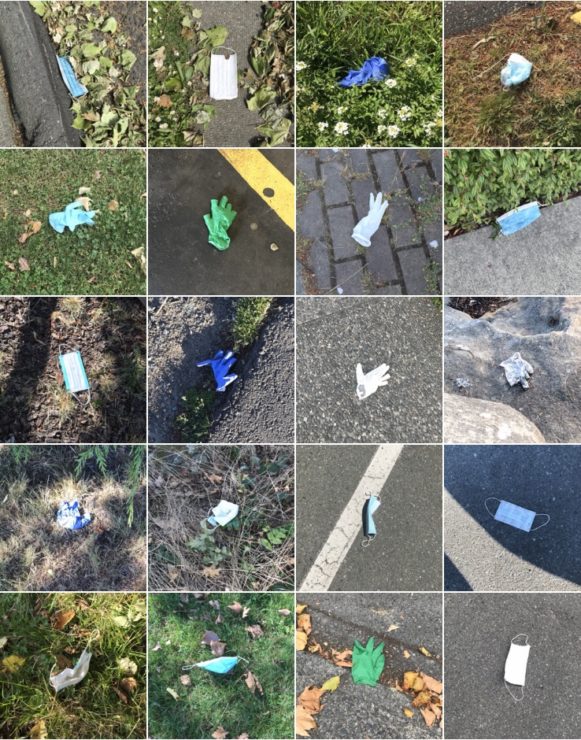Advice for countering the increase in plastic waste during the pandemic

While personal protective eqipment (PPE) such as masks and gloves serve to protect public health, their increased demand and improper disposal are contributing to plastic waste build up.
Plastics are unable to decompose, instead, breaking down into microplastics then further into nanoplastics. In one form or another, plastics remain in the environment. In an article for Environmental Science and Technology researchers estimate 129 billion face masks and 65 billion gloves contribute to plastic pollution per month globally.
Disposable face masks are fashioned with polymeric material such as polypropylene, polyurethane, polyacrylonitrile, polystyrene, polycarbonate, polyethylene, or polyester. Disposable gloves are made of latex, vinyl, or nitrile.
300 million tons of plastics produced every year, and when disposed of improperly, 8 million tons of that finds its way to the ocean. According to The Ocean Cleanup, the Great Pacific Garbage patch, an island made of floating plastics, located between California and Hawaii, is about 1.6 million square kilometers and is the largest of five.
Matt Miller, a PhD student in Earth and Ocean Sciences at UVic and an executive for UVic Surfrider says that due to pandemic restrictions the club has been unable to meet for beach clean-ups.
“I’ve definitely observed PPE pollution, so masks and gloves particularly littered in the environment,” Miller said. “I started observing it in my neighborhood just on walks, right in the beginning of the pandemic.”
Miller notes that people are less likely to pick up litter because of health concerns.
In a recent study conducted in Toronto, personal protective equipment (PPE), including face masks, disposable gloves, and sanitary wipes, were monitored in grocery store parking lots, residential areas, and recreational trails. From the 1306 recorded PPE items found in the study, gloves accounted for 44 per cent, masks made up 31 per cent, and 25 per cent were wipes.
Masks
Reusable masks made of fabric can help prevent transmission of COVID-19 while also preventing waste from reaching the ocean.
Setting yourself up in advance with a variety of reusable masks and keeping them in a variety of locations (ie. jacket pocket, school bag, hanging at the door) may help managing and remembering masks. It is also important to wash your masks. The World Health Organization (WHO) recommends a daily wash at 60 degrees.
Although medical masks are generally more effective, wearing a mask that covers your nose and mouth in combination with maintaining a two-metre distance and washing your hands is an effective way to prevent the spread of COVID-19. According to the WHO, medical masks should be used for the healthcare professionals, people with symptoms, people who are caring for an individual with COVID-19, those who are aged 60 and up, and those with health concerns. WHO also notes that reusable masks can be used by the general public in public spaces, work places, and on transportation while maintaining a physical distance.
Gloves
Alongside single-use masks, gloves have been frequenting the litter collection much more since the beginning of the pandemic.
The Center for Disease Control and Prevention notes that even when running errands the best way to combat prevention of COVID-19 is to wash and sanitize your hands. Gloves may still spread the virus.
Washing and sanitizing hands, keeping a 2 metre distance, and wearing a mask can help prevent the spread of the virus.
Take Out Meals
Another growing concern is the increase of take-out meals during the pandemic. Requesting decreased plastic in your order is one way to combat increased usage of single-use plastics. Miller suggests requesting no cutlery, or even eating at home more often.
As we move through the pandemic, and learn more about the virus, it is important that we keep ourselves and our environment safe. As plastics remain in the environment for thousands of years, finding alternative ways to reduce plastic consumption and properly dispose of PPE during the pandemic is critical.







